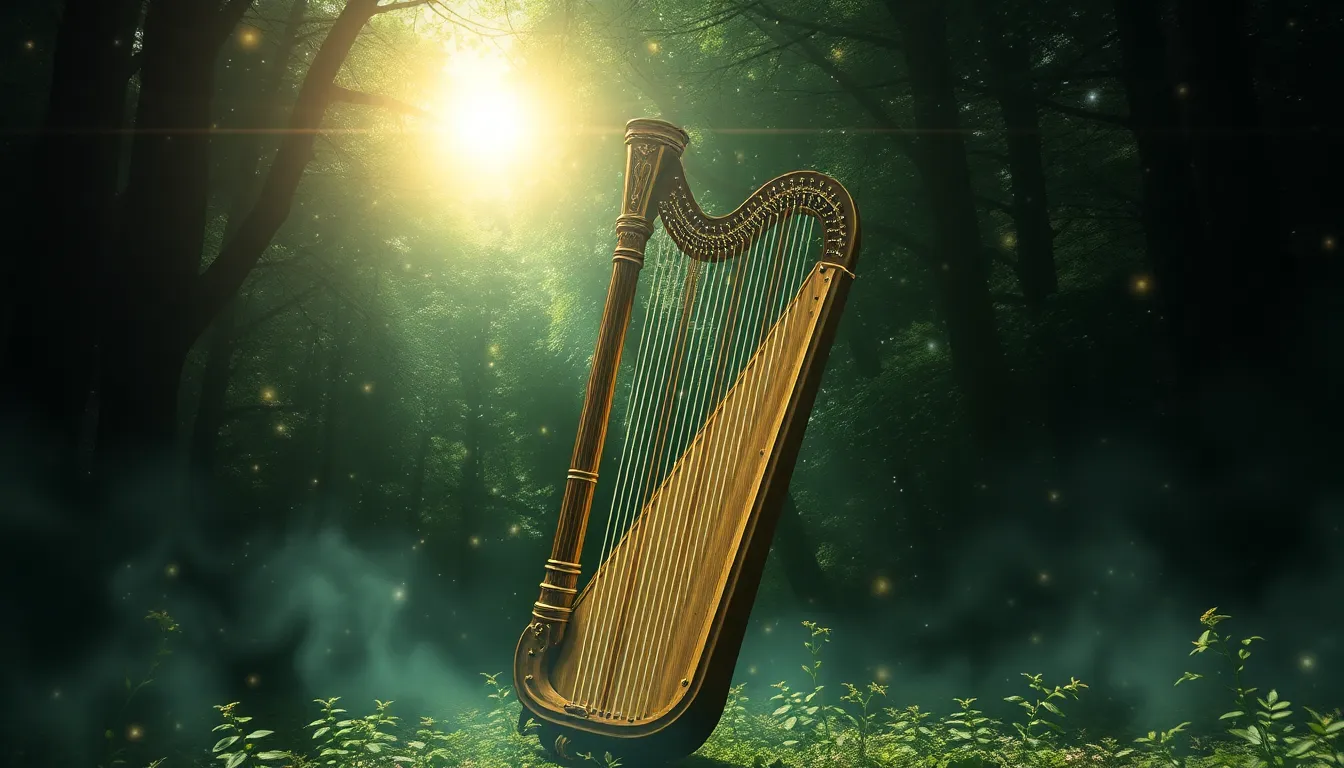The Enchanted Harp: Music That Can Change Fate
Introduction: The Allure of the Enchanted Harp
The harp, with its elegant form and ethereal sound, has captivated hearts and minds throughout history. Its strings vibrate with a resonance that transcends mere sound, weaving a tapestry of emotion that speaks to the soul. From ancient times to modern-day performances, the harp has held a significant place in various cultures, symbolizing everything from divine communication to the essence of human experience.
At its core, music serves as a transformative force, capable of altering perceptions, evoking memories, and even changing destinies. The concept of the enchanted harp suggests that music can not only reflect our emotions but also reshape our fates. In exploring this theme, we delve into the mythical origins, scientific principles, and cultural significance of the enchanted harp.
The Mythical Origins of the Enchanted Harp
Throughout history, enchanted harps have been woven into the fabric of folklore and legends, often depicted as magical instruments capable of influencing fate. These tales reveal the profound relationship between humans and music, suggesting that harps possess powers that can alter reality.
- Celtic Myths: In Celtic mythology, the harp is often associated with the gods and goddesses, believed to possess the ability to enchant listeners and influence the natural world. The story of Aengus and his harp illustrates this connection, as his music could call the souls of the dead.
- Greek Legends: Orpheus, a legendary figure, is known for his enchanting music played on the lyre, a string instrument similar to the harp. His melodies could charm animals, coax plants into bloom, and even sway the hearts of the gods.
- Native American Tales: Many Native American cultures have stories of magical instruments that connect the spiritual and physical worlds. The harp symbolizes harmony and balance, often used in rituals to invoke change.
The Science of Sound: How Music Influences Emotions and Behavior
The psychological effects of music are well-documented, with research showing that sound can significantly influence our emotions and behavior. The enchanted harp, with its soothing tones, exemplifies this phenomenon.
Studies have demonstrated that:
- Music can evoke strong emotional responses, ranging from joy to sadness.
- Specific sound frequencies can alter our moods, helping to alleviate anxiety and promote relaxation.
- Listening to music can stimulate the release of neurotransmitters, including dopamine, which are associated with pleasure and reward.
Thus, the enchanting sound of the harp can serve as a powerful tool for emotional transformation and healing.
The Harp in Literature and Art: Symbols of Fate and Change
The harp’s symbolism extends beyond folklore into literature and visual arts, where it often represents fate, change, and the power of music. Many notable literary works feature enchanted harps, illustrating their impact on characters and their journeys.
- Literature: In works like “The Faerie Queene” by Edmund Spenser, the harp is used to convey divine inspiration and the transformative power of music.
- Visual Arts: Artists throughout history have depicted harps in paintings and sculptures, symbolizing harmony and the connection between the earthly and the divine. For instance, in Botticelli’s works, the harp often represents the muse of inspiration.
Case Studies: Historical Figures Who Used Music to Influence Fate
Throughout history, several musicians and composers have wielded their craft to change the course of events, demonstrating the profound impact of music on fate.
- Ludwig van Beethoven: His compositions during the tumultuous times of the Napoleonic Wars inspired hope and resilience among the people, influencing societal change.
- J.S. Bach: Known for his intricate compositions, Bach’s music has been credited with bringing spiritual enlightenment and renewal to many during the Baroque era.
- Bob Dylan: As a voice of the 1960s, Dylan’s protest songs played a crucial role in the civil rights movement, illustrating how music can be a catalyst for social change.
The Enchanted Harp in Modern Culture
In contemporary culture, the enchanted harp continues to inspire artists across various mediums. Films, music, and theater often reinterpret the concept, highlighting the harp’s magical qualities.
- Film: Movies like “The Secret of Kells” feature enchanted harps that play pivotal roles in the storyline, symbolizing creativity and the magic of storytelling.
- Theater: Productions such as “The Phantom of the Opera” utilize haunting harp melodies to evoke emotion and heighten dramatic tension.
- Music: Modern artists like Joanna Newsom and Loreena McKennitt incorporate harp music into their compositions, drawing on its mystical qualities to enhance their storytelling.
The Therapeutic Power of Harp Music
The therapeutic use of harp music has gained recognition in various settings, including hospitals and mental health institutions. Harp therapy is employed to promote relaxation, reduce anxiety, and enhance overall well-being.
Benefits of harp therapy include:
- Reduction of stress and anxiety levels.
- Improvement of sleep quality.
- Enhanced emotional expression and processing.
Personal testimonies from patients and therapists highlight the profound healing properties of harp music, affirming its role in promoting holistic health.
The Role of Music in Personal Transformation and Fate
Many individuals have experienced significant life changes catalyzed by music. Personal stories reveal how musical experiences can lead to transformative decisions.
- Some individuals credit music with helping them overcome addiction, while others find solace during times of grief.
- Musical encounters often inspire people to pursue their passions, leading to career changes and personal growth.
These stories illustrate the deep connection between music and personal fate, emphasizing its role as a catalyst for change.
Creating Your Own Enchanted Harp Experience
Incorporating harp music into daily life can enhance your well-being and foster personal transformation. Here are some practical tips:
- Playlists: Curate a playlist of harp music for relaxation, meditation, or inspiration.
- Meditation Practices: Use harp music as a backdrop for mindfulness or meditation sessions.
- Live Performances: Attend concerts or local performances to experience the enchantment of live harp music.
Conclusion: The Lasting Impact of the Enchanted Harp on Destiny
The enchantment of the harp resonates through time, illustrating music’s enduring power to shape our lives and destinies. From ancient legends to modern interpretations, the harp symbolizes transformation and the potential for change. As you explore your musical journey, remember the stories of those who harnessed the power of music to influence their fate. Embrace the magic of the enchanted harp and discover the transformative force that lies within your own musical experiences.


